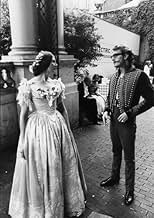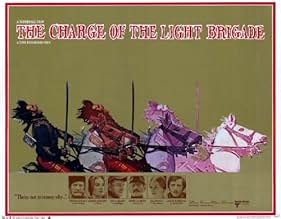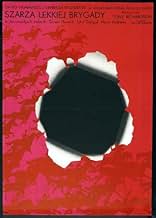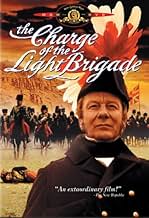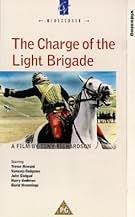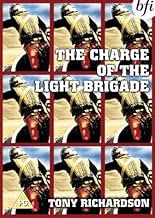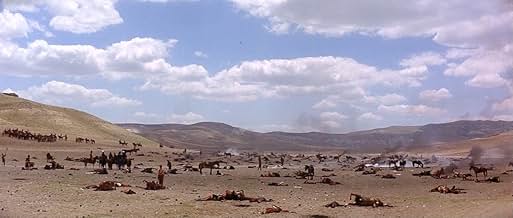IMDb-BEWERTUNG
6,6/10
4139
IHRE BEWERTUNG
Füge eine Handlung in deiner Sprache hinzuIn 1854, during the Crimean War, poor planning leads to the British Light Brigade openly charging a Russian artillery position with tragic consequences.In 1854, during the Crimean War, poor planning leads to the British Light Brigade openly charging a Russian artillery position with tragic consequences.In 1854, during the Crimean War, poor planning leads to the British Light Brigade openly charging a Russian artillery position with tragic consequences.
- Regie
- Drehbuch
- Hauptbesetzung
- Nominiert für 7 BAFTA Awards
- 7 Nominierungen insgesamt
John J. Carney
- Trooper Mitchell
- (as John Carney)
Howard Marion-Crawford
- Lt. Gen. Sir George Brown
- (as Howard Marion Crawford)
Christopher Cunningham
- Farrier
- (as Chris Cunningham)
Empfohlene Bewertungen
We have to wait nearly two hours for the eponymous event which climaxes this film. Prior to this we see a series of apparently unconnected episodes which give the viewer an insight into the workings of Victorian society, including anti-intellectuallism and idleness among the 'upper' classes, and brutality and theft among the 'scum' recruited in the slums.
While almost plot less this section of the film does follow a core of characters whose lives are connected by army service. The main character is Captain Louis Nolan, an idealistic professional in an army of amateurs. "England is looking well" he says in the first scene of the film. The irony is that the country that looks so good is a cruel and mismanaged place. Unlike his fellow officers, who have bought their posts, he has worked his way up the ranks of the Indian Army by merit. He despises them and they feel he isn't a 'gentleman'.
Nolan has very definite views on how war should be fought. Faced with the reality of battle and the inadequacies of the commanders (the senile Raglan and the childish Lucan and Cardigan) his impatience and temper have tragic consequences as he impetuously points the Light Brigade ("There, my Lord, is your enemy, there are your guns!") towards the bloody fiasco of which he is the first victim. The man who seems to know best makes the biggest blunder of all. Eye-witnesses said the hideous scream Nolan gave when he was hit stayed with them all their lives and the film re-creates it in a truly chilling way.
Although the film does reflect 1960's attitudes to war and politics (and I actually prefer these to the attitudes of the 21st Century) its setting is so perfectly realized that it hasn't dated as a '60s film'. In fact it seems better with the passage of time. If you can free yourself from the idea of a narrative history and give yourself up to a series of impressions which add new layers of understanding 'Charge of the Light Brigade' makes a fine historical film.
While almost plot less this section of the film does follow a core of characters whose lives are connected by army service. The main character is Captain Louis Nolan, an idealistic professional in an army of amateurs. "England is looking well" he says in the first scene of the film. The irony is that the country that looks so good is a cruel and mismanaged place. Unlike his fellow officers, who have bought their posts, he has worked his way up the ranks of the Indian Army by merit. He despises them and they feel he isn't a 'gentleman'.
Nolan has very definite views on how war should be fought. Faced with the reality of battle and the inadequacies of the commanders (the senile Raglan and the childish Lucan and Cardigan) his impatience and temper have tragic consequences as he impetuously points the Light Brigade ("There, my Lord, is your enemy, there are your guns!") towards the bloody fiasco of which he is the first victim. The man who seems to know best makes the biggest blunder of all. Eye-witnesses said the hideous scream Nolan gave when he was hit stayed with them all their lives and the film re-creates it in a truly chilling way.
Although the film does reflect 1960's attitudes to war and politics (and I actually prefer these to the attitudes of the 21st Century) its setting is so perfectly realized that it hasn't dated as a '60s film'. In fact it seems better with the passage of time. If you can free yourself from the idea of a narrative history and give yourself up to a series of impressions which add new layers of understanding 'Charge of the Light Brigade' makes a fine historical film.
This movie was made in 1968 but I never got the impression from watching it that it was anti war. The movie was made entirely with British actors and a British director and the Brits never had an antiwar movement (because their government gave up its militarism after Suez in 1955). The movie depicts the British army as it existed in 1850. This was a period when one gained advancement in the army by money or title. It was a largely decadent and unprofessional army and the movie I think characterizes it rather well. In fact, Nolan wrote a book complaining about the need to professionalize the army but it took the near disastrous Crimean War to affect any serious changes (it too the British Navy another generation or more to make similar changes). At the time, there was a debate about the effectiveness of cavalry with some believing that no defensive position could withstand the full force of a disciplined cavalry charge--a left over from the Napoleonic Wars--while others thought a charge into artillery was near suicidal. Nolan's roll in the battle remains controversial and whether he delivered inaccurate verbal orders to Acrdigan to charge to prove the effectiveness of cavalry even against artillery or warn the brigade away has not been established because Nolan was killed.
As for the Crimean War, it also depicts the drum beat to war accurately and the implication that most of the dying was done by commoners and much of the death was caused by disease. It was an ugly war. What isn't shown is that the condition of the Russian army was far worse. The poor Russian peasant soldiers were sent to fight with smoothbore Napeolonic Era muskets with an effective range of perhaps 100 meters while the British and the French was new rifled muskets with a range of over 300 meters. In some battles very small forces of British held off huge numbers of Russians killing hundreds.
The Battle of Balaclave is generally depicted accurately. It was a calamity of errors. Capt Nolan actually lost his head during the charge and witnesses indicate that his horse continued running with corpse in the saddle for some distance before the body collapsed. The charge was initiated by the heavy Brigade led by Lord Lucan. There was a rivalry between Lucan and Lord Cardigan (brothers in law) and both brigades initially made the charge but the Heavies did not enter the Valley of Death. The Light Brigade continued into the Valley and were decimated but not wiped out. In fact they were supported by the French cavalry the Chasseurs d'Afrique and the Russian positions were in fact overrun. I think the charge as depicted in this movie is one of the most exciting I have ever seen captured in the cinema.
The so called Valley of Death has changed considerably since the 1850s. By 1994, it was entirely planted in vineyards and the only way to gain some sense of the battle is to find the famous Tractir Bridge over the Tchernaya River and follow the lines of hills. As for the town of Balaclava...I have a photograph of the town in 1854 with the British fleet anchored in the harbor. I took a photograph of this village in 1994 from just about the same angle as the 1854 image and then compared the two. The place is completely unchanged with even the stone buildings remaining. Of course, the village today is the base of the Ukranian Black Sea fleet and there is a not so secret submarine base cared into the limestone cliffs inside the harbor.
We may think that the Crimean War is ancient history but the people of Crimea do not. They have sort of a living museum called the Panaorma. This is a museum devoted to the siege of Sevastopol. There is a circular path and the visitor is engulfed by the on going battles on both sides of the path. One may wander the hills above Sevastopol and many of the rifle pits and trenches from the war remain (they were reused by the Russians during the unsuccessful defense of the city in 1942). It is a wonderful museum and it exemplifies the Russian attitude that history is alive and they don't forget their past.
This is a historically accurate movie. It moves a little slow at times and it has some amusing cartoonish graphics (almost reminiscent of Monty Python graphics). All the major players obviously have a great deal of fun with their rolls.
Anecdotes: Tony Richardson's two children, Nastasha and Joely are in the film as well is his sister in law Vanessa Redgrave. I think I have these relationships correct. Anyway, they are all related.
As for the Crimean War, it also depicts the drum beat to war accurately and the implication that most of the dying was done by commoners and much of the death was caused by disease. It was an ugly war. What isn't shown is that the condition of the Russian army was far worse. The poor Russian peasant soldiers were sent to fight with smoothbore Napeolonic Era muskets with an effective range of perhaps 100 meters while the British and the French was new rifled muskets with a range of over 300 meters. In some battles very small forces of British held off huge numbers of Russians killing hundreds.
The Battle of Balaclave is generally depicted accurately. It was a calamity of errors. Capt Nolan actually lost his head during the charge and witnesses indicate that his horse continued running with corpse in the saddle for some distance before the body collapsed. The charge was initiated by the heavy Brigade led by Lord Lucan. There was a rivalry between Lucan and Lord Cardigan (brothers in law) and both brigades initially made the charge but the Heavies did not enter the Valley of Death. The Light Brigade continued into the Valley and were decimated but not wiped out. In fact they were supported by the French cavalry the Chasseurs d'Afrique and the Russian positions were in fact overrun. I think the charge as depicted in this movie is one of the most exciting I have ever seen captured in the cinema.
The so called Valley of Death has changed considerably since the 1850s. By 1994, it was entirely planted in vineyards and the only way to gain some sense of the battle is to find the famous Tractir Bridge over the Tchernaya River and follow the lines of hills. As for the town of Balaclava...I have a photograph of the town in 1854 with the British fleet anchored in the harbor. I took a photograph of this village in 1994 from just about the same angle as the 1854 image and then compared the two. The place is completely unchanged with even the stone buildings remaining. Of course, the village today is the base of the Ukranian Black Sea fleet and there is a not so secret submarine base cared into the limestone cliffs inside the harbor.
We may think that the Crimean War is ancient history but the people of Crimea do not. They have sort of a living museum called the Panaorma. This is a museum devoted to the siege of Sevastopol. There is a circular path and the visitor is engulfed by the on going battles on both sides of the path. One may wander the hills above Sevastopol and many of the rifle pits and trenches from the war remain (they were reused by the Russians during the unsuccessful defense of the city in 1942). It is a wonderful museum and it exemplifies the Russian attitude that history is alive and they don't forget their past.
This is a historically accurate movie. It moves a little slow at times and it has some amusing cartoonish graphics (almost reminiscent of Monty Python graphics). All the major players obviously have a great deal of fun with their rolls.
Anecdotes: Tony Richardson's two children, Nastasha and Joely are in the film as well is his sister in law Vanessa Redgrave. I think I have these relationships correct. Anyway, they are all related.
Russia has invaded Turkey, much to the chagrin of the British, who sees this as a threat to their dominance of the globe through their Empire. As the politicians debate a course of action, the military prepare for war, recruiting men from the working classes and officers from the ruling classes. One such officer is Captain Louis Nolan, who comes under the charge of Lord Cardigan one of the old guard and a cantankerous, arrogant leader to boot. This form of leadership feeds through his officers and brings conflict with the straight approach of Nolan. This conflict reaches The Times and enrages Nolan, who continues his arrogance even as the Light Brigade join the forces heading through Turkey.
With stories of all manner of goings-on during the three year production of this film it is little wonder that in some regards this film is all over the place. I am unsure of the historical value of the writing but it doesn't manage to do much in regards characters or consistent tone (either in the film or the individuals). Nolan is a fine example of this as he never manages to be an engaging character and, along with the rest of them, just comes off as larger than life characters seemingly without any significant basing in reality. This makes it hard to get into as it seem to jump around in narrative without any real drive. This is all the more frustrating because on the edges it does do some things pretty well. From the very start there is a clear judgment on the English mentality the world policeman, the mighty lion, the posh officer mindset of war as a sort of game and so on. This is backed up pretty much by the rest of the film, which spends more time on this than on the characters, and it is interesting although maybe not enough to base a whole film on the animations alone are sharp enough to suffice if contrasted well with a reality.
The film may also be of interest recently because the most obvious parallel is now with the US's position in the world not quite an Empire but certainly with all the influence and invincibility that GB once believed it had. It is also relevant because it highlights the horrors of war and, even without characters we care about, the final charge is a mess of death that lacks any of the honour or beauty that the hillside generals talk of minutes before. Sadly all this is wasted in a messy film that cannot seem to get an even tone is Cardigan a worthless leader or a comedy character? Are we meant to enjoy the battles or be horrified by them? And what's to be made of Nolan's constant preachy dialogue alongside scenes of comic value? These major problems take away so very much from the film that it is hard to really stick with it and see what little good there is. The cast is made up of every British actor from the period who was between the age of 30 and 60. OK, maybe that is an exaggeration but at times it would have been easy for me to believe that. Hemming plays his character far too solemn and serious a problem when it makes his already poor dialogue sound like the ramblings of a pretentious fool. Howard has fun in his role but his is an one note performance that gets too close to a send up and confuses the tone of the film somewhat. Gielgud is good because he shows the same faults as Howard's character but does it without the overblown blustering. The support cast is made up of many British actors from the period but, without the material, many of them come and go without anything of value to add.
Overall this should have been a much more interesting and engaging film but it blows it with a messy structure, poor plot and uneven and confused tone. The harsh send up of 'the good IL' Empire' and the officer class is well done but is not enough to base the whole film on it should have been a subtext not the whole ballgame. Like another reviewer has said, it is funny that, given the years put into this and the sheer scale of the production that the most memorable and successful parts are the little animations that poke fun at the view this country once held of itself in themselves they are a warning to other would-be empires of our time.
With stories of all manner of goings-on during the three year production of this film it is little wonder that in some regards this film is all over the place. I am unsure of the historical value of the writing but it doesn't manage to do much in regards characters or consistent tone (either in the film or the individuals). Nolan is a fine example of this as he never manages to be an engaging character and, along with the rest of them, just comes off as larger than life characters seemingly without any significant basing in reality. This makes it hard to get into as it seem to jump around in narrative without any real drive. This is all the more frustrating because on the edges it does do some things pretty well. From the very start there is a clear judgment on the English mentality the world policeman, the mighty lion, the posh officer mindset of war as a sort of game and so on. This is backed up pretty much by the rest of the film, which spends more time on this than on the characters, and it is interesting although maybe not enough to base a whole film on the animations alone are sharp enough to suffice if contrasted well with a reality.
The film may also be of interest recently because the most obvious parallel is now with the US's position in the world not quite an Empire but certainly with all the influence and invincibility that GB once believed it had. It is also relevant because it highlights the horrors of war and, even without characters we care about, the final charge is a mess of death that lacks any of the honour or beauty that the hillside generals talk of minutes before. Sadly all this is wasted in a messy film that cannot seem to get an even tone is Cardigan a worthless leader or a comedy character? Are we meant to enjoy the battles or be horrified by them? And what's to be made of Nolan's constant preachy dialogue alongside scenes of comic value? These major problems take away so very much from the film that it is hard to really stick with it and see what little good there is. The cast is made up of every British actor from the period who was between the age of 30 and 60. OK, maybe that is an exaggeration but at times it would have been easy for me to believe that. Hemming plays his character far too solemn and serious a problem when it makes his already poor dialogue sound like the ramblings of a pretentious fool. Howard has fun in his role but his is an one note performance that gets too close to a send up and confuses the tone of the film somewhat. Gielgud is good because he shows the same faults as Howard's character but does it without the overblown blustering. The support cast is made up of many British actors from the period but, without the material, many of them come and go without anything of value to add.
Overall this should have been a much more interesting and engaging film but it blows it with a messy structure, poor plot and uneven and confused tone. The harsh send up of 'the good IL' Empire' and the officer class is well done but is not enough to base the whole film on it should have been a subtext not the whole ballgame. Like another reviewer has said, it is funny that, given the years put into this and the sheer scale of the production that the most memorable and successful parts are the little animations that poke fun at the view this country once held of itself in themselves they are a warning to other would-be empires of our time.
Anyone who is looking for an historically accurate depiction of the charge of the Light Brigade at Balaklava, and the events that preceded it, had best leave this one on the video store shelf. Visually, the movie is well done and the cavalry action scenes are nearly as good as those portrayed in Sergei Bondarchuk's "Waterloo" - despite the fact that Bondarchuk had most of the Russian Army as extras. Unfortunately, director Tony Richardson couldn't make up his mind whether he was making a movie or a social commentary and his indecision pervades the story line from beginning to end. I notice that some other commentators here have praised the film for its accuracy. In reality it was anything but - most of the sub-plots were fabricated and some of the actual battle scenes are either gross distortions of what actually happened or improbable speculations. Captain William Morris (17th. Lancers), for example, was not foppish dilettante soldier portrayed - rather he was a tough, seasoned professional who had attended the Royal Military College, served in three previous campaigns and had taken part in the charge against the Sikh guns at Aliwal, India. Nor did he ride back wounded to the British lines after the charge as the movie would have it - in fact he was so badly wounded that he was left on the battlefield and was rescued much later by two of his comrades, both of whom received the Victoria Cross. And Captain Louis Nolan certainly didn't have an affair with Morris' wife (Vanessa Redgrave) as the plot implies - Nolan had never met Morris before they were both sent to the Crimea.
It was much in vogue to make iconoclastic war movies in the late '60s - "Oh! What a Lovely War", was another - probably because of Vietnam. It's a great pity that Richardson choose 'The Charge of the Light Brigade' as his protest vehicle since it leaves an enduring stain on the memory of 700 very gallant men. Yes, there were 700, not 600 - Tennyson got it wrong.
It was much in vogue to make iconoclastic war movies in the late '60s - "Oh! What a Lovely War", was another - probably because of Vietnam. It's a great pity that Richardson choose 'The Charge of the Light Brigade' as his protest vehicle since it leaves an enduring stain on the memory of 700 very gallant men. Yes, there were 700, not 600 - Tennyson got it wrong.
I do find it fascinating to come across obscure, almost forgotten films like this with familiar faces and famous actors in it. It was made ca. 1968, and in the true spirit of '68, it is strongly anti-war, anti-military, and anti-establishment, even though it is set in the Victorian era, the height of the Romantic age, when Military valor was largely celebrated. Military life is here portrayed in terms of ranks of men being bullied and brutalized by each successive rank above them, with the biggest, meanest and stupidest ones at the top.
I found it quite interesting to see the famous charge, celebrated in the romantic verses of Tennyson, portrayed in such a matter-of-fact manner as a series of tactical blunders due to bad communication and incompatible personalities among the commanders. These events were supposedly well-researched, and though I am not informed on the subject, I found this version of events very credible. Even with the high level of weapons and communications technology we have today, this sort of thing still happens. It must have been very common in centuries past.
To me, the dialog of this film and its delivery by the actors is its most remarkable feature. Seeing films that depict distant eras, I've often thought that these eras must have not just looked different from what we are used to, but sounded very different as well. If we were suddenly dropped into Victorian England, we wouldn't always understand what was being said or inferred to us. Words, phrases, gestures, facial expressions or body language that would have obvious meaning in that time and place would be strange to us. The language and syntax would, of course, be different, but so would the rhythm, pace, expressive color and accenting of the way people spoke. `Charge of the Light Brigade' does a remarkable job of not just looking, but sounding like a distant place and time. For a viewer who is not educated in antique British expressions and military jargon, as I am not, it makes watching this film a bit challenging, but it's like spending 130 minutes in the Victorian age as a so-called `fly-on-the-wall,' as the British put it. There was more than one line spoken after which I thought `say what?' But that's OK. It doesn't kill you, just encourages you to think a bit. This aspect of the film looks to be well-researched as well, a superb example of a somewhat talky script in which great care is taken with the language and its use by the actors. The script doesn't serve the purpose of an exposition device for the dumbest members of the audience, a very common vice in films, particularly big-money films engineered to alienate as few people as possible. It's an integral part of a design to recreate an unfamiliar time and place, and as such, a bit uncompromising.
I found it quite interesting to see the famous charge, celebrated in the romantic verses of Tennyson, portrayed in such a matter-of-fact manner as a series of tactical blunders due to bad communication and incompatible personalities among the commanders. These events were supposedly well-researched, and though I am not informed on the subject, I found this version of events very credible. Even with the high level of weapons and communications technology we have today, this sort of thing still happens. It must have been very common in centuries past.
To me, the dialog of this film and its delivery by the actors is its most remarkable feature. Seeing films that depict distant eras, I've often thought that these eras must have not just looked different from what we are used to, but sounded very different as well. If we were suddenly dropped into Victorian England, we wouldn't always understand what was being said or inferred to us. Words, phrases, gestures, facial expressions or body language that would have obvious meaning in that time and place would be strange to us. The language and syntax would, of course, be different, but so would the rhythm, pace, expressive color and accenting of the way people spoke. `Charge of the Light Brigade' does a remarkable job of not just looking, but sounding like a distant place and time. For a viewer who is not educated in antique British expressions and military jargon, as I am not, it makes watching this film a bit challenging, but it's like spending 130 minutes in the Victorian age as a so-called `fly-on-the-wall,' as the British put it. There was more than one line spoken after which I thought `say what?' But that's OK. It doesn't kill you, just encourages you to think a bit. This aspect of the film looks to be well-researched as well, a superb example of a somewhat talky script in which great care is taken with the language and its use by the actors. The script doesn't serve the purpose of an exposition device for the dumbest members of the audience, a very common vice in films, particularly big-money films engineered to alienate as few people as possible. It's an integral part of a design to recreate an unfamiliar time and place, and as such, a bit uncompromising.
Wusstest du schon
- WissenswertesFilming was immensely problematic. Director Tony Richardson fired a stunt coordinator whose manic swordplay killed several horses. An earthquake destroyed the hotel used by the production. David Hemmings was extremely temperamental on-set. The crew and extras, many of whom were Turkish soldiers, fought verbally and physically with local villagers who resented their incursion into the area. Richardson's strange mixture of perfectionism and historical flippancy grated on both his crew and advisers. While filming the final battle, the soldiers were called away for a NATO war exercise, forcing Richardson to shoot the scene with only a few dozen stuntmen.
- PatzerThe character called Featherstonehaugh (played by Corin Redgrave) has his name pronounced more or less as it is written, with four syllables. An upper-class Englishman of the mid-19th century (or, indeed, today) would pronounce it "Fanshawe".
- Zitate
Lord Raglan: It will be a sad day for England when her armies are officered by men who know too well what they are doing - it smacks of murder.
- Crazy CreditsIn the animation over the opening credits, the English lion roars just as "A Woodfall Film" appears onscreen (mimicking Leo the Lion at the start of Metro-Goldwyn-Mayer movies).
- Alternative VersionenAlthough the cinema version was complete the 1993 UK video release was cut by 7 secs to edit footage of horse-falls. The 2008 Optimum DVD has the cuts length extended to 14 secs and features the 6 minutes shorter print as mentioned below.
- VerbindungenFeatured in Ein Pechvogel namens Otley (1969)
- SoundtracksThe Girl I Left Behind Me
(uncredited)
Traditional
Arranged by Trevor L. Sharpe
Heard before the Battle of the Alma
Top-Auswahl
Melde dich zum Bewerten an und greife auf die Watchlist für personalisierte Empfehlungen zu.
- How long is The Charge of the Light Brigade?Powered by Alexa
Details
- Erscheinungsdatum
- Herkunftsland
- Sprachen
- Auch bekannt als
- La carga de la brigada ligera
- Drehorte
- Pecenek, Türkei(charge in the Valley of Death)
- Produktionsfirma
- Weitere beteiligte Unternehmen bei IMDbPro anzeigen
Box Office
- Budget
- 8.000.000 $ (geschätzt)
- Laufzeit2 Stunden 19 Minuten
- Farbe
- Sound-Mix
- Seitenverhältnis
- 2.35 : 1
Zu dieser Seite beitragen
Bearbeitung vorschlagen oder fehlenden Inhalt hinzufügen

Oberste Lücke
By what name was Angriff der leichten Brigade (1968) officially released in India in English?
Antwort

